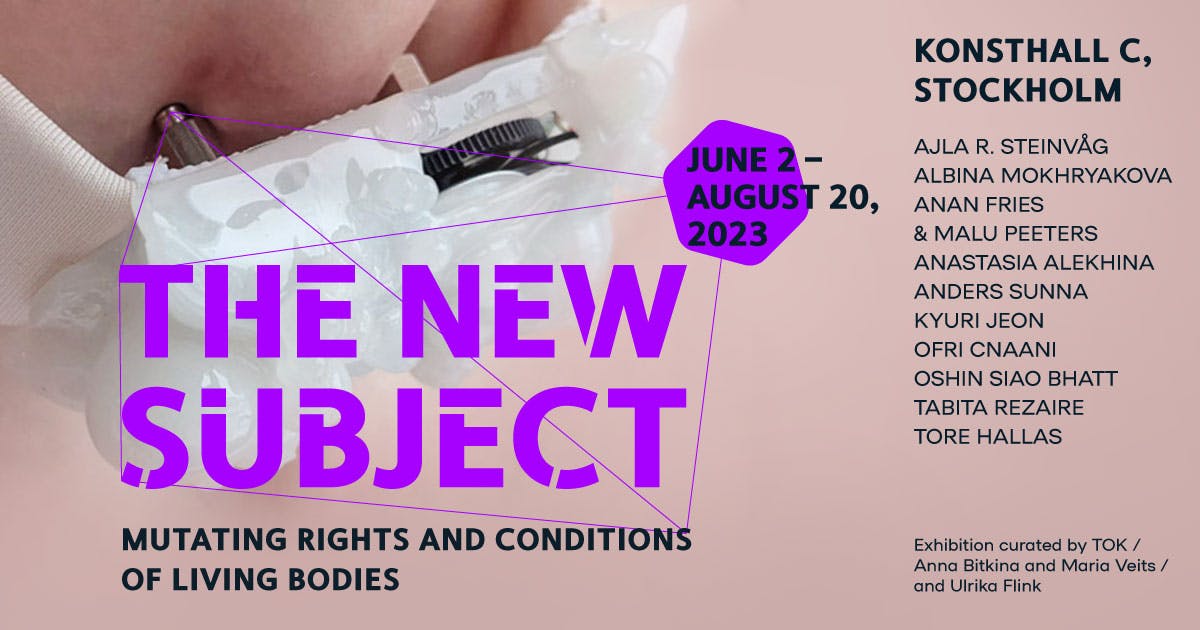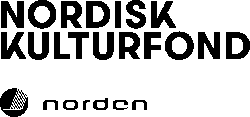The New Subject. Mutating Rights and Conditions of Living Bodies

The New Subject. Mutating Rights and Conditions of Living Bodies
2 June - 20 August 2023
Konsthall C, Stockholm
Ajla R. Steinvåg, Albina Mokhryakova, Anan Fries & Malu Peeters, Anastasia Alekhina, Anders Sunna, Kyuri Jeon, Ofri Cnaani, Oshin Siao Bhatt, Tabita Rezaire, Tore Hallas.
Co-curated by TOK /Anna Bitkina and Maria Veits/ and Ulrika Flink
A new exhibition The New Subject. Mutating Rights and Conditions of Living Bodies at Konsthall C marks the beginning of a series of four interconnected exhibitions and accompanying public events about the evolving challenges of the body in connection to global biopolitics and technological developments, focusing on the legal, somatic and cognitive dimensions.
Initiated by TOK Curators, The New Subject is a two-year collaboration between the curatorial duo and four European art institutions: Konsthall C (Sweden), Kunsthal NORD (Denmark), Oksasenkatu 11 (Finland), and KINDL – Centre for Contemporary Art (Germany). Each participating venue will feature an exhibition co-curated by TOK and local curator(s), addressing global body-related problematics while also acknowledging the specific contexts and challenges of the local communities.
Drawing on the ideas of Achille Mbembe, who argues that today’s societies of control rely on the "manufacture of a new subject that is at once a physiological assemblage, a synthetic and electronic assemblage, and a neuro-biological assemblage," the project aims to decode and expose the repressive and manipulative mechanisms incorporated into various constituents of the contemporary state. By examining the body as a contested site for ideological and political power games, the exhibition series also aims to explore potential modes of existence that defy the coercive machinations of state engineering.
Under the umbrella title The New Subject, the four exhibitions investigate how new medical technologies and biological enhancements impact our bodies and mind and the ways in which governments use policies to control and instrumentalize them. The project also explores how posthuman and post-anthropomorphic discourse is shaping our understanding of the body and its possibilities to navigate the world and the self more consciously. To track these advancements, each exhibition will showcase a comprehensive historical timeline of significant legislative and biopolitical changes, spotlighting local measures aimed at both empowering and regulating the body.
The first exhibition, Mutating Rights and Conditions of Living Bodies, at Konsthall C responds to the notion of a sovereign body treated as disposable by corporations and governments. Through various artistic mediums the exhibition explores the ways in which power structures and state apparatuses impact the body, employing legislation as a tool for control, often leading to the violation of rights and freedoms. By highlighting instances of violence and suppression carried out under the guise of legal frameworks, the exhibition challenges viewers to question the ethical and moral dimensions of such practices. The artists look closely at how bodies are used as resources in the context of wars and technological/military/medical experiments, which often results in the exploitation and mistreatment of historically marginalized and vulnerable groups of people. The works by Ajla R. Steinvåg, Albina Mokhryakova, and Kyuri Jeon critically explore the state and corporate utilitarian approach to bodies, exposing the unequal valuing of lives based on factors such as race, gender, social standing, and ethnic background, while also addressing the theme of state-initiated sacrifice and mortality in this context. Tabita Rezaire exposes the historical exploitation of Black women's bodies in medical science, confronting the ongoing presence of biological warfare in the pharmaceutical industry.
Additionally, the exhibition examines the impact of the pervasive nature of surveillance and state control on personal autonomy and bodily integrity. It delves into the potential consequences of constant monitoring and the erosion of personal boundaries, raising important questions about the balance between security, individual liberties and various forms of self-determination. The work by Ofri Cnaani explores the impact of algorithmic capitalism on the human body, questioning our attunement to technological systems and the commodification of body data, while Anastasia Alekhina tackles the complex issue of domestic abuse, questioning the nature of human violence as a bodily condition. Anders Sunna addresses the impact of enforcement of discriminatory legislative norms on indigenous communities, advocating for their rights and self-governing within societal frameworks.
The works by Anan Fries and Oshin Siao Bhatt touch upon urgent matters like expansion and boundaries of reproductive rights and choices. Developing reproductive technologies tend to help overcome fertility, gender and age limitations. However, these new developments raise a number of ethical issues and often face obstacles, especially in the context of return to conservative LGBTQ+ targeted legislation in some societies. Tore Hallas explores the theme of the alienated body, particularly through the lens of fatness and queerness. The artist prompts critical reflections on the ways in which discrimination operates and the impact it has on individuals who navigate intersecting identities.
By bringing these complex issues into the public sphere, the exhibition intends to foster a critical understanding of the power dynamics at play in society and provoke discussions around potential alternative narratives and ways of organizing and relating to the body, legislation, and governance. It seeks to challenge existing norms, stimulate empathy, and empower individuals to question and challenge oppressive structures that govern our lives.
Opening: June 2, 18.00 - 21.00
19.00 - introduction speeches by curators and artists, refreshments
In Stockholm Тhe New Subject is hosted by Konsthall C, whose artistic director Ulrika Flink co-curates the exhibition together with Anna Bitkina and Maria Veits /TOK.
TOK is a nomadic and international curatorial collective founded in 2010 by Anna Bitkina and Maria Veits. Their practice is rooted in historical analysis and political imagination, generating multidimensional projects that explore the causes and consequences of mutating political realities. Often working outside of usual art spaces, TOK infiltrates into social structures, bringing their strains and corrupt functions into the public discourse in order to revisit the roles and powers of social institutions and redraft their potential future. Their investigations encompass local governance, public space, media, educational and legal systems, with a specific emphasis on excluded histories, communities and experiences, politics of built environments, and the imposed hierarchies between different societies and geographies. TOK's activities involve curating exhibitions, socially-oriented art projects, educational events, and publications.
The curators of TOK have collaborated with various international institutions, including Nieuwe Instituut in Rotterdam, Tallinn Photomonth Biennale, Goethe Institute, BOZAR Fine Arts Center, De Apple, Stedelijk Museum Bureau Amsterdam - SMBA, raumlabor Berlin, Grafikens Hus, Center for Digital Art in Holon, and the Weisman Museum. They have also undertaken residencies at The Fire Station in Dublin, Flux Factory in New York, HIAP, Botkyrka (Stockholm), A-I-R Barents, and KAI Tallinn Art Center. In 2021, TOK was the winner of the apexart international open call 2020-2021 with their exhibition "Voicing the Silence," which explores the intersections of gender and law. Their current curatorial focus includes examining the relationships between the state and the body and uncovering remnants of systemic colonial violence embedded in social structures.
Ulrika Flink has been curating exhibitions in Sweden and abroad in recent years. Flink currently works in Hökarängen, outside Stockholm, as the artistic director of Konsthall C, a leading force in a socially engaged art scene where innovation and curatorial and artistic experiments are at the center. Flink works as the artistic director for Konstfrämjandet Stockholm and is also engaged as curator for Black Archives Sweden. Internationally, she has curated prestigious exhibitions such as Momentum 9 in 2017, a significant biennial for contemporary Nordic art. In 2021, Borås celebrated its 400th anniversary, coinciding with the Borås Art Biennial titled "Deep Listening for Longing," co-curated by Ulrika Flink. Flink has extensive experience working with art locally, nationally, and internationally, including institutions such as Tensta Konsthall, Autograph ABP (London), Tate Modern, and Bonniers Konsthall. She holds a master's degree in Curating Contemporary Art from the Royal College of Art in London.
With support from the Nordisk Kulturfond and the Nordic Council of Ministers.

